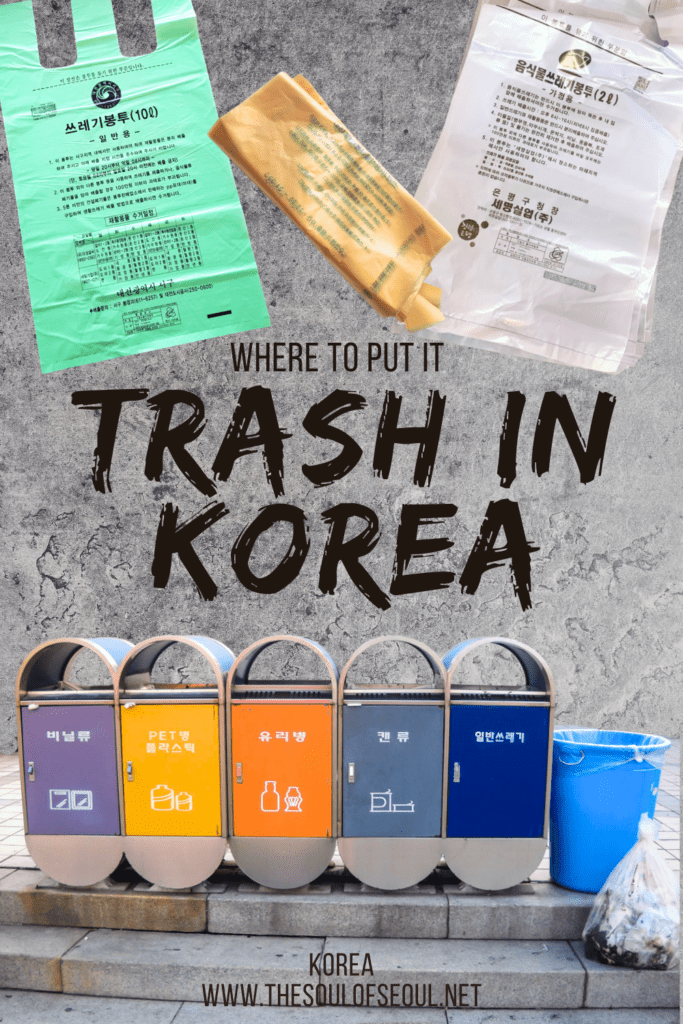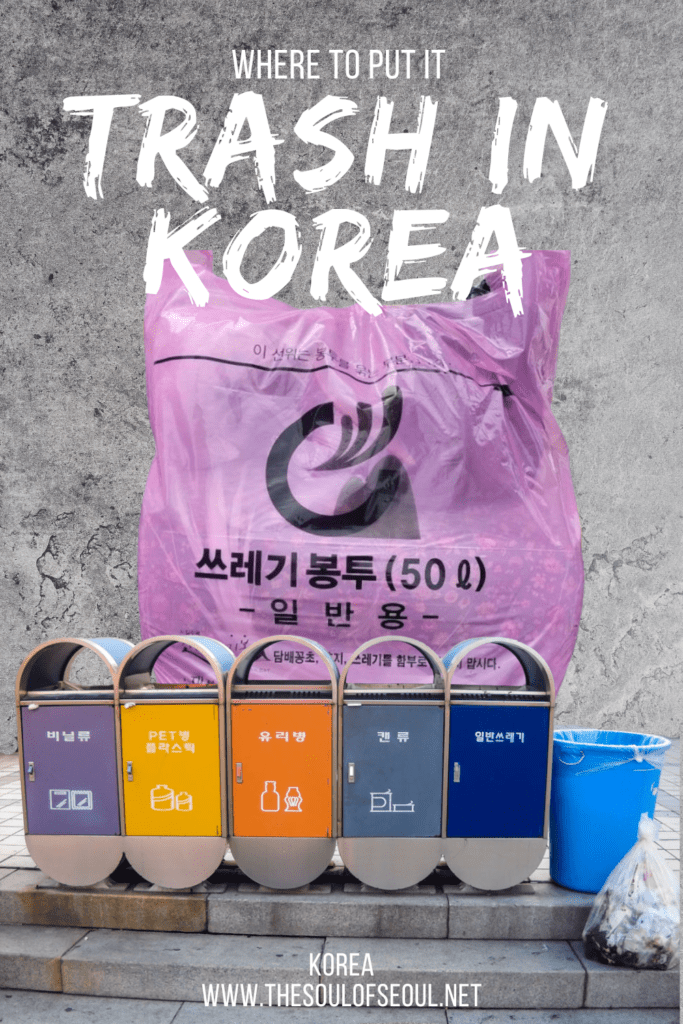Guide to Throwing Away Trash in Korea: In Public and At Home
Last Updated on April 10, 2024
Whether you’re visiting Korea as a tourist or have moved to your first Korean apartment, you’ve probably run into the issue of how and where to throw away your trash. There are very few bins on the Seoul sidewalks, so from your first day in the country, you’ll soon find yourself carrying trash around for most of the day
Whether you’ve moved into a Korean apartment, a university dorm, or you’re simply staying in an Airbnb in Korea, you’ll find that throwing out the trash isn’t quite as simple as putting your waste into a trash bag and throwing it into a large garbage bin. From buying the correct trash bags to knowing where to leave each of them, trash disposal in South Korea is a minefield!
Recycling is also mandatory in South Korea, and you risk facing large fines if you don’t separate your trash correctly. Get ready to learn about the food that DOESN’T go into the food trash bags, the recycling that does get separated, and more in this guide to all things trash in Korea.
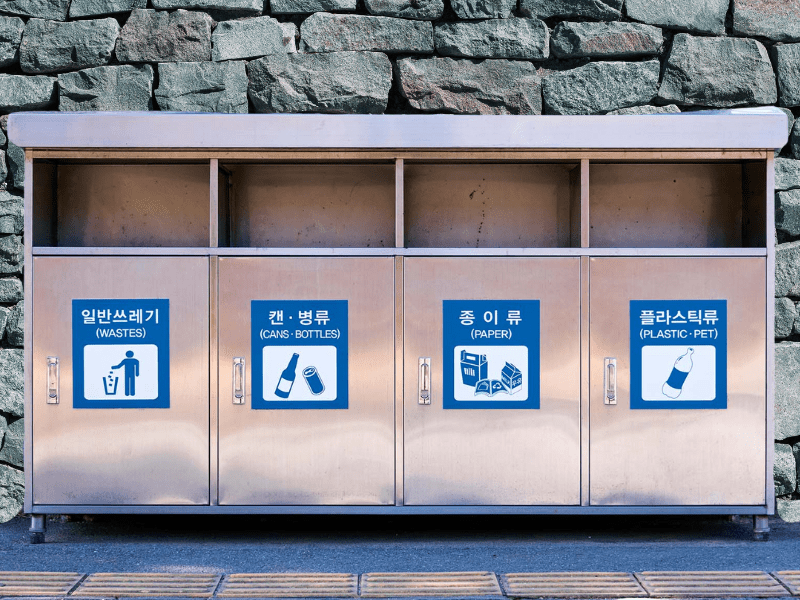
Throwing out trash in Korea is a complicated process, so read on to ensure you know how to throw it out correctly:
- Recycling in Korea
- Food Waste in Korea
- General Waste in Korea
- How to Throw out Large Items and Appliances in Korea
- How to Dispose of Clothing in Korea
- How to Dispose of Trash in Public in Korea
(This post contains affiliate links, which means I receive a certain percentage of a sale if you purchase after clicking at no cost to you. Thank you for your support.)
Recycling in Korea
The Korean trash system is incredibly thorough, meaning that it’s important to make sure you play your part in separating and recycling your trash properly.
Failure to separate your trash and recycle could land you with a fine from your landlord or Airbnb host should the local council find that you have not been separating your trash properly. Not to mention, you could end up with an angry neighbor yelling at you over it, too.
Don’t worry, it’s okay to make the occasional mistake, however regularly throwing out unclean recycling, putting plastic or glass in the general waste bags, or not separating your recycling properly can be a problem.
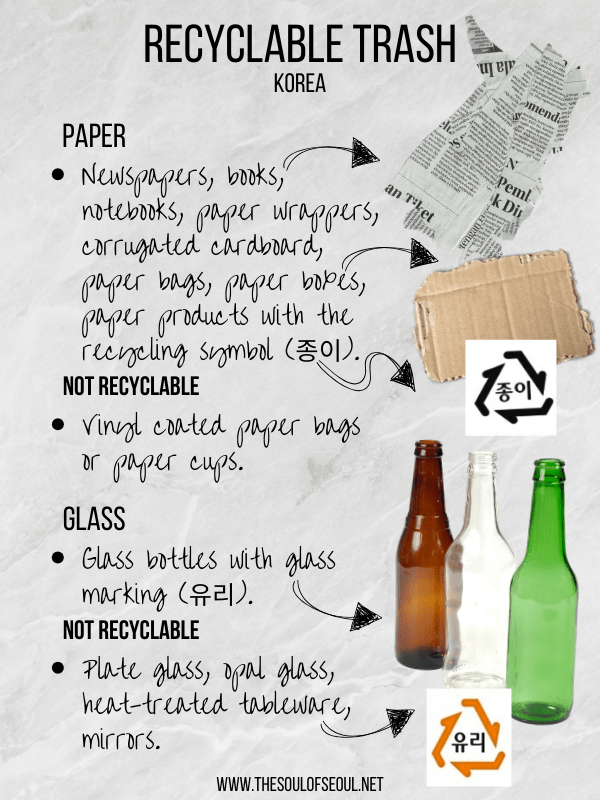
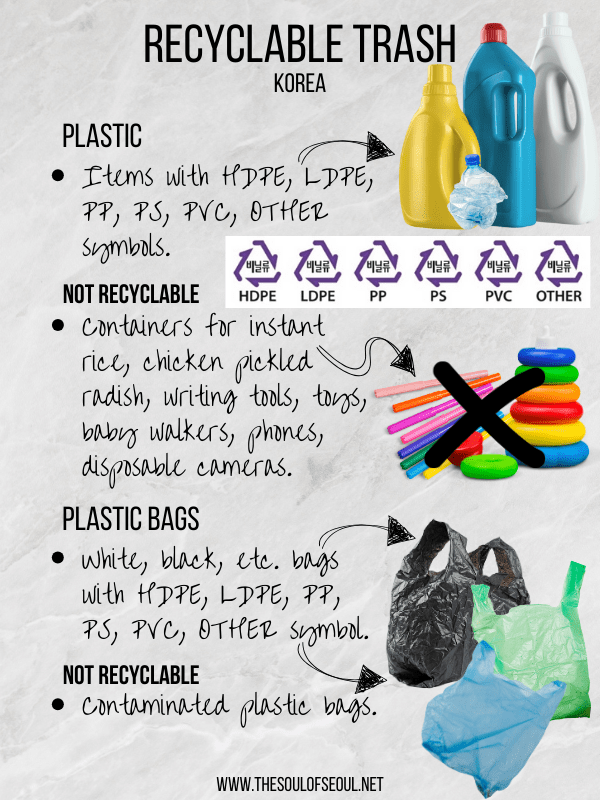
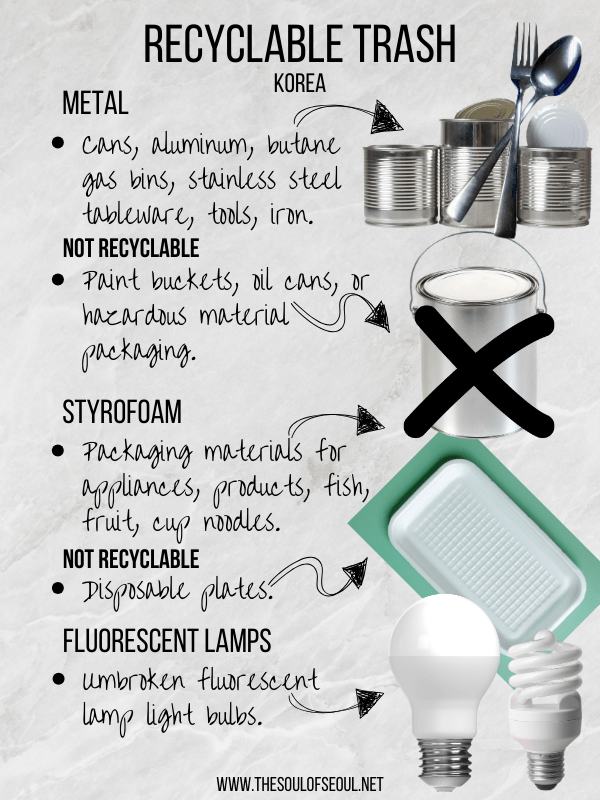
Where to Dispose of Recycling in Korea
No matter where you’re staying in Korea (other than in a hotel), you’ll likely have to throw out your trash yourself. Whether the apartment you’re staying in is rented, or you’re staying in an Airbnb, you will be responsible for separating out your trash and recycling.
Almost every apartment block (especially those in big cities) has an on-site recycling center. Some are large and contain bins for items such as metal and styrofoam, and some are simply a few small bins to throw out plastic, paper, glass, and cans.
These recycling centers are usually located in the basement or car park area of the apartment block, but if you have trouble finding them, be sure to get in touch with your landlord. If you live in a smaller residential area, take a walk in the evenings, and you’ll find where the piles are placed so that trash trucks can come pick them up later.
General waste and food waste are usually disposed of in a different area, typically outside of the apartment building.
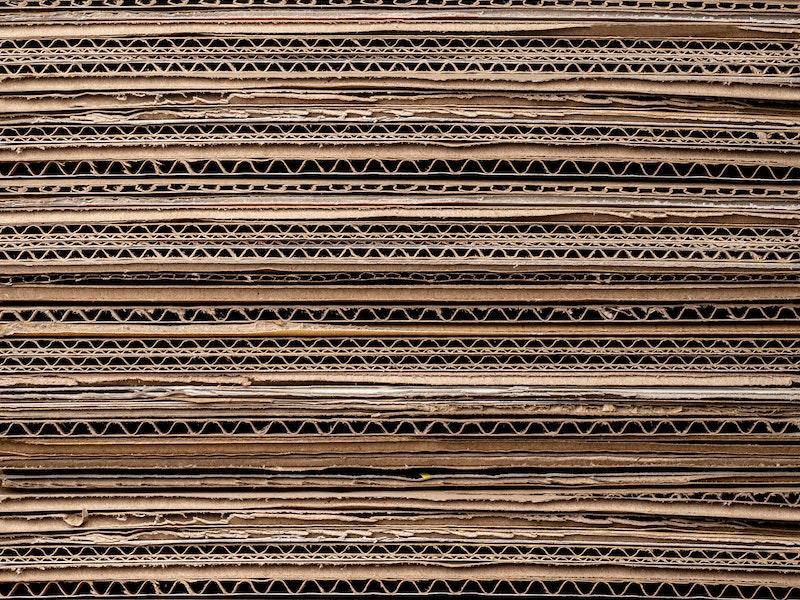
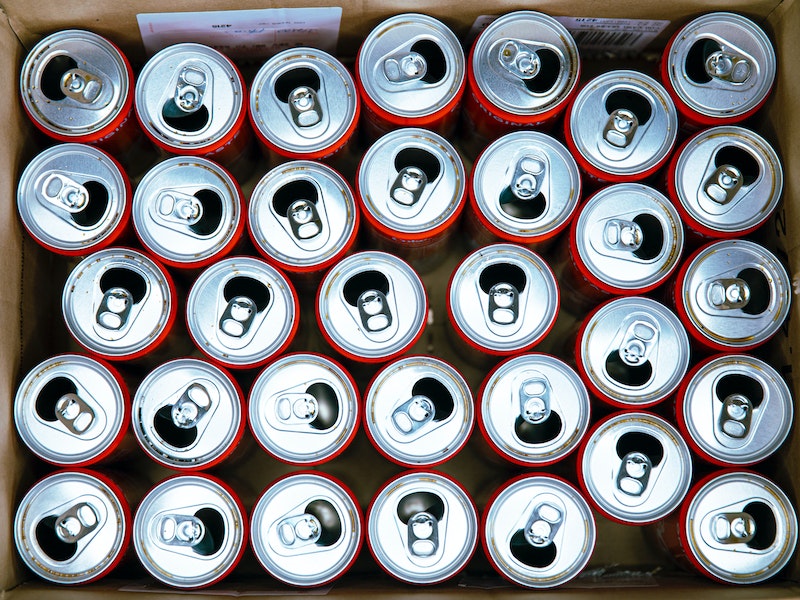
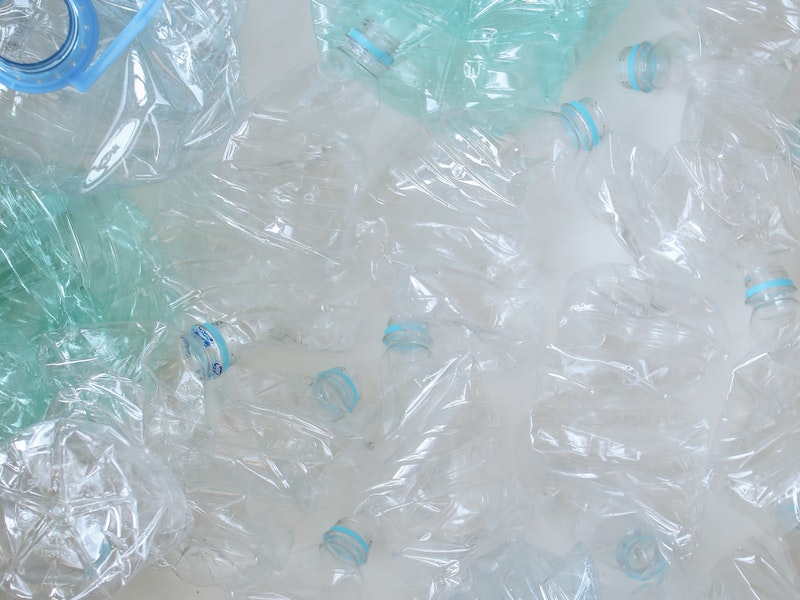
How to Separate Recycling in Korea
Every item you recycle in Korea should be free from contaminants. Tip out any excess waste liquids or food from the packaging, rinse it, and remove any stickers or labels.
Some items are made of multiple materials, so be sure to separate these before throwing them in the trash – take plastic lids off of cardboard containers (and cut out the plastic seal), remove metal lids from glass bottles, and recycle them in the appropriate trash cans.
Food Waste in Korea
Food waste in Korea is to be disposed of separately from both the recycling and general waste. Learning the ins and outs of food trash in Korea can be tricky. Read carefully so you know what to put in it and what not to put in it!
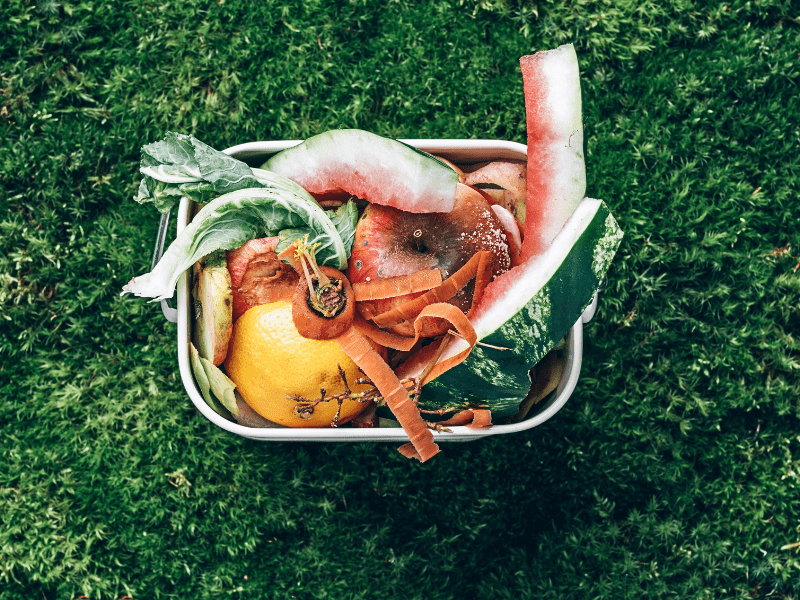
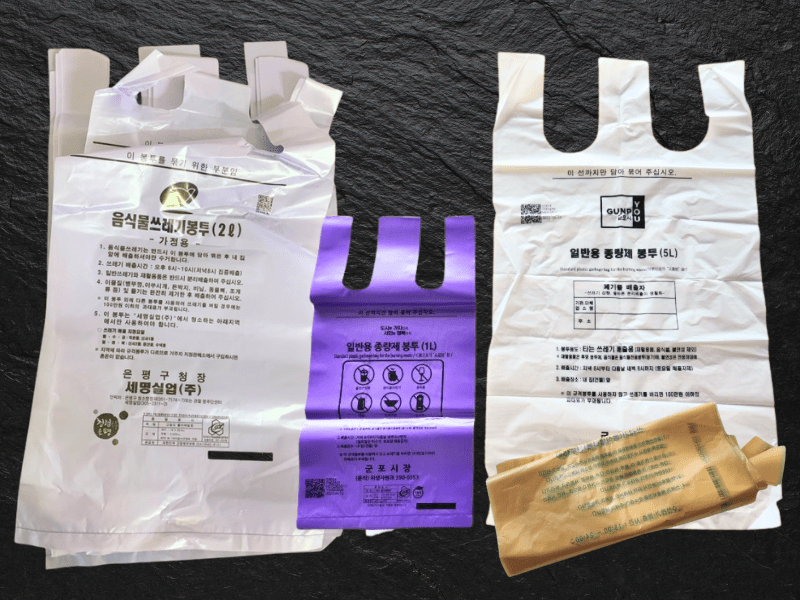
How to Dispose of Food Waste in Korea
Food waste in Korea is usually disposed of in small colorful plastic bags, which can be purchased at any convenience store. These are usually kept behind the counter, so you’ll need to ask for the bags, instead of picking them up from the shelf.
Note that you shouldn’t just purchase them anywhere as they are different colors depending on location and have the area name on the bags themselves. You’ll want localized bags.
To ask for food trash bags in Korea, you can say:
- 종량제 쓰레기 봉투 주세요 (Jongryangje sseuraegi bongtu jusaeyo)
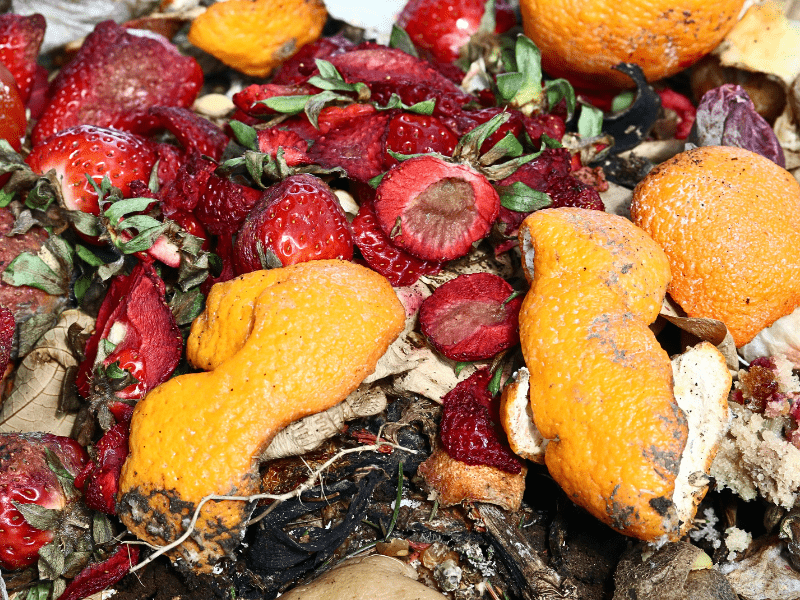
These are often disposed of near the general waste, but it’s a good idea to double-check with your landlord where to put them, as some buildings have dedicated garbage bins for collecting food trash bags.
If you live in a larger apartment building, you may need to dispose of your food waste in a different way. Again, it’s best to double-check with your landlord before disposing of any food trash, but some apartment blocks have trash shoots for food waste., where you can throw out food waste without needing to bag it first.
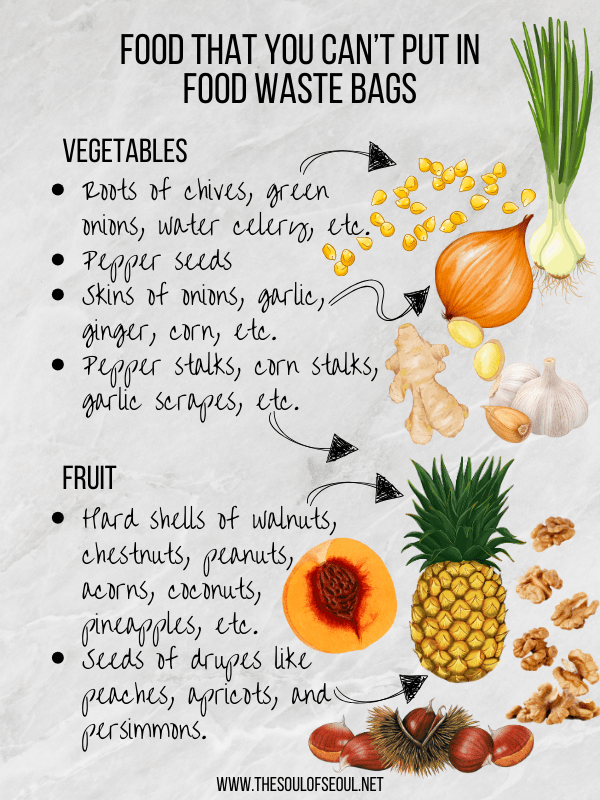
What Goes into Food Waste Bags in Korea
Whilst it is a ‘food waste’ disposal scheme, it’s not all waste that comes from the kitchen! As a general rule, if an animal would eat it, it goes in the food waste bag, if an animal wouldn’t eat it, it’s better to put it in the general waste instead.
This is because food waste is usually composted in Korea, and so you’ll want to ensure you don’t include anything that could cause issues with this process.
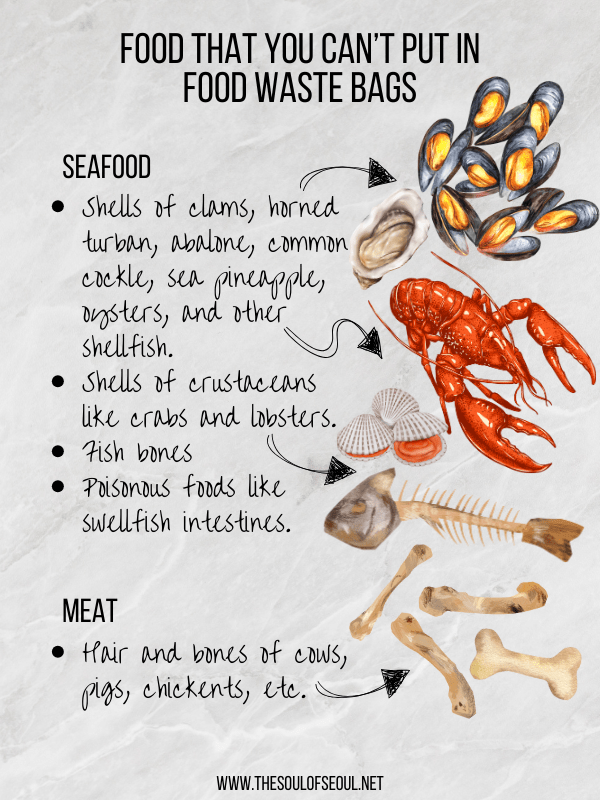
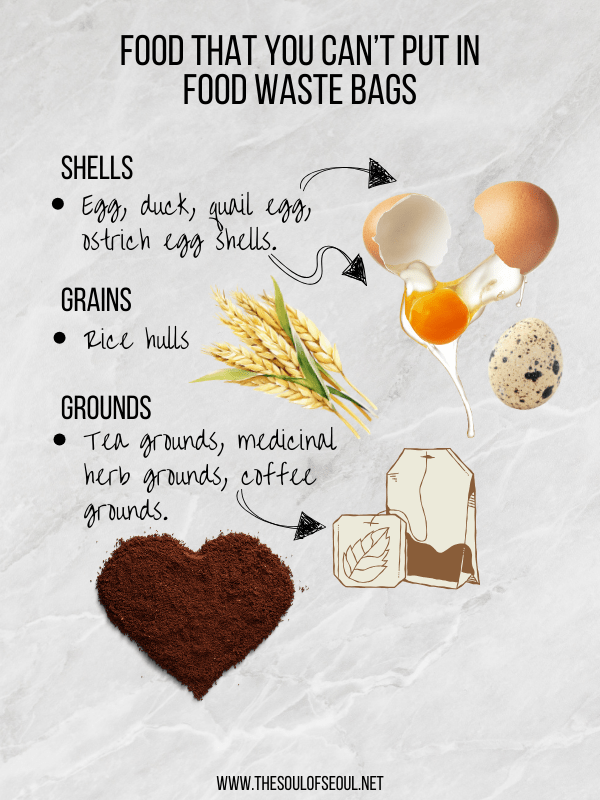
As you can see in the visuals above, there are a number of foods that do NOT go into the food trash bags in Korea and they include: Root vegetables (chili seeds, chives, onion skins, corn husks, etc.), shells of nuts, seeds of stone fruits such as peaches and plums, seafood shells, fish bones, animal bones, egg shells, coffee grounds, tea, etc.
How to properly dispose of food waste:
- Remove water and moisture, mud, and dirt before throwing away food waste.
- Salty foods like kimchi, soybean paste, and gochujang (Korean chili pepper paste), should be washed first.
- Green onion peels and large vegetables like pumpkins, radishes, and cabbages, should be chopped up finely before disposal.
General Waste in Korea
Other than recycling, general waste is likely the type of trash you’ll have the most of in Korea. This is anything that cannot be recycled and/or is contaminated.
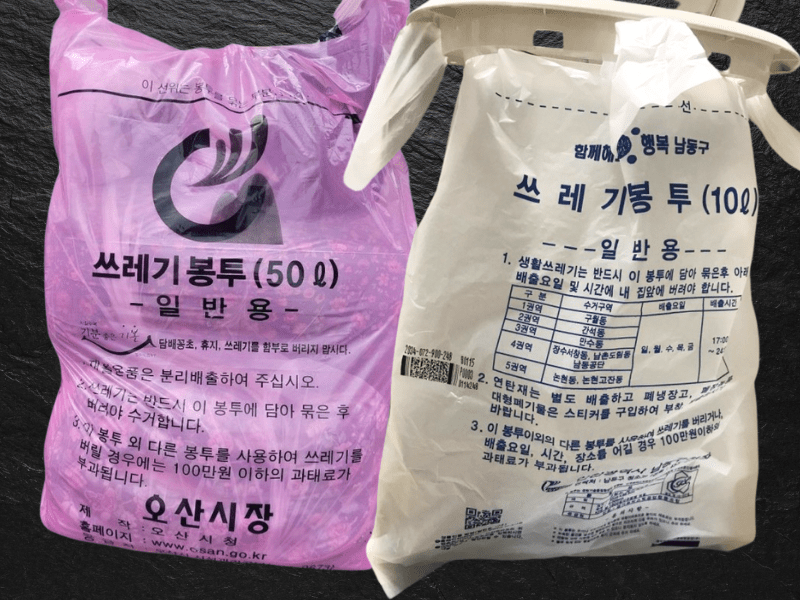
How to Dispose of General Waste in Korea
General waste in Korea should be placed into trash bags. Much like the food waste bags, these can be purchased from behind the counter of any convenience store in the district that you’ll be throwing away trash.
To buy general waste bags in Korea, you can say:
- 종량제 쓰레기 봉투 주세요 (Jongryangje sseuraegi bongtu jusaeyo).
One thing to note is that these trash bags are specific to the area you’re living in, which is especially important to note if you’re moving around a particular city such as Seoul. As an example, bags used in Mapo-gu cannot then be used in a different district, such as Gangnam-gu.
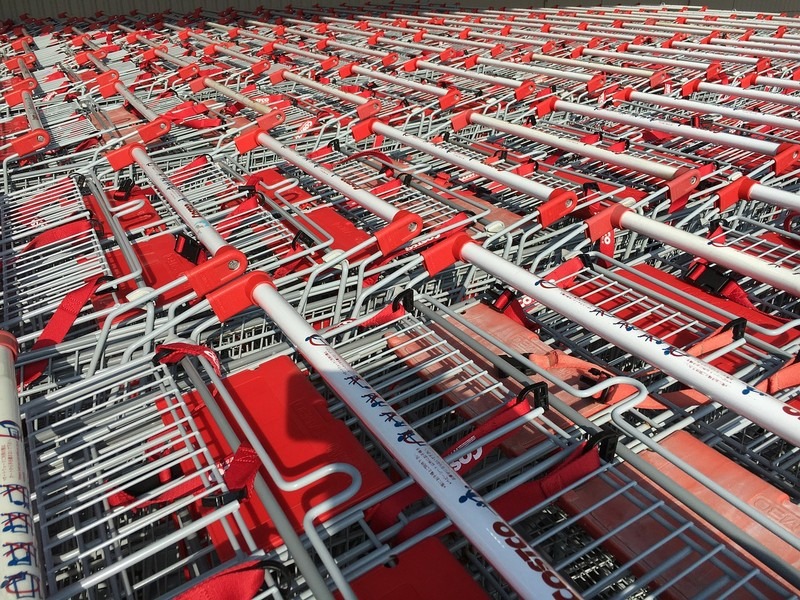
If you shop at local grocery stores in Korea and ask for a bag, they will usually give you a labeled general waste bag to pack your groceries in, that way it can be re-used as a trash bag in that district afterward!
General waste is usually disposed of in front of the apartment building or in a specific general waste bin. Much like recycling and food waste, the location of disposal is unique to each building, so be sure to check with your landlord before putting out the trash.
Depending on where you live, you’ll want to find out when the trash days are. If you’re in an apartment building, you can likely put trash downstairs any day of the week. But if you’re in a smaller villa-type home, you’ll have specific days to put trash outside. It’s best to stick to disposal times between 20:00 and 24:00, or you’ll end up with some neighbors giving your angry looks for dirtying up the place.
How to Throw out Large Items and Appliances in Korea
If you need to throw out large items, it’s likely that you will have lived in Korea long enough to be able to speak a little bit of Korean, or you’ll have some Korean friends or contacts who are able to help you out.
The disposal of larger items varies by the area you live in. Some require you to call your local district office and schedule it for pickup, while other areas require you to purchase a sticker. If this is required, you’ll want to visit your local community service center, or the website of your local Gu office, and purchase the large waste stickers there, so that the disposal program knows they’re to be collected.
If you don’t speak Korean, and have the time, it’s a good idea to offer these larger items for sale or for free on online marketplaces, if they’re still in good condition of course.
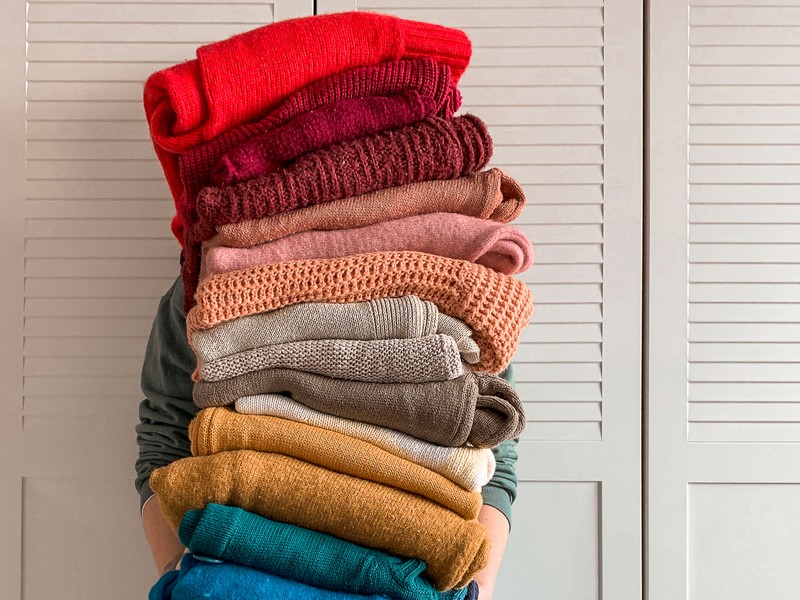
How to Dispose of Clothing in Korea
Whilst not quite a large waste item, clothing doesn’t go in the general waste either (unless it is soiled or contaminated and not able to be recycled).
Instead, there are green clothing donation bins dotted around in each district. Simply find your closest one, and go pop your old clothes in it. If your clothes are still in excellent condition though, you may want to consider selling them online.
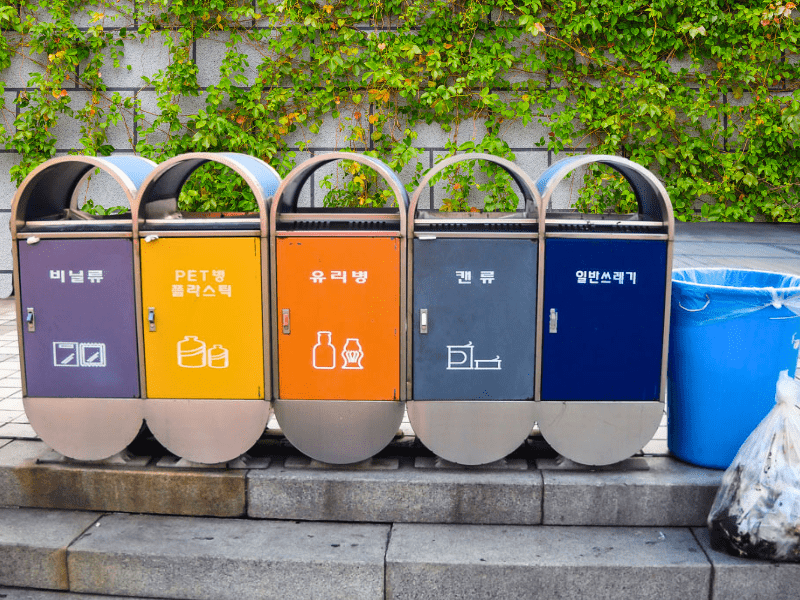
How to Dispose of Trash in Public in Korea
Many people visiting South Korea wonder what to do with their trash when they realize the lack of trash cans on Korean sidewalks.
Of course, the easiest way is to carry around a small Ziploc bag with you to carry your trash until you get home, but if you’re in desperate need of a trash can, there are a couple of places you can find them. There are usually trash cans in public toilets and trash and recycling cans in subways and train stations.
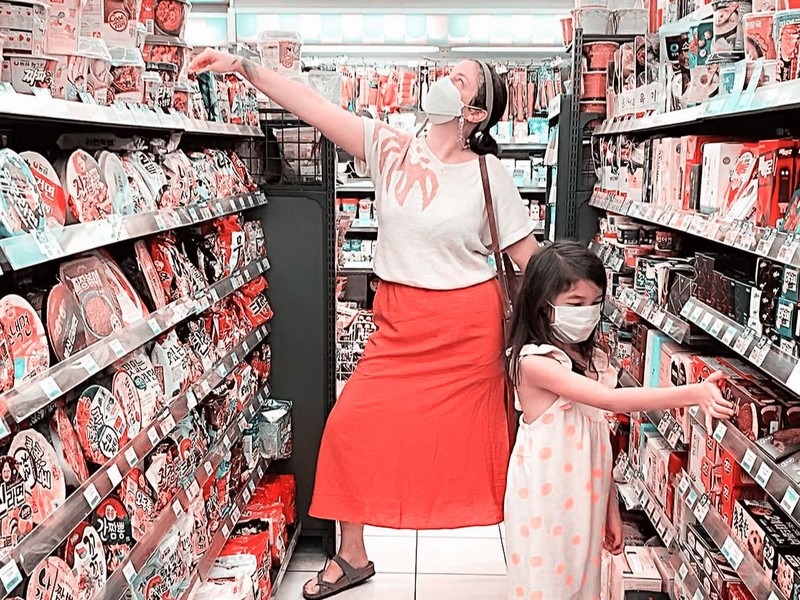
If you’ve purchased something like a snack from a convenience store and are planning on eating it there and then, there are trash cans inside the store for you to put your waste before you leave. I do not recommend wandering in to convenience stores and emptying a lot of trash though as the staff may yell you out of the store.
If you’re visiting a street food spot, such as Myeongdong, give your trash back to the vendor who served you, as they will be able to put it in their own personal trash bag without littering in the streets.
I hope you found this guide to throwing away trash in South Korea helpful, as with anywhere in the world, this process can vary from district to district, but these are the general rules for most major areas. Trash in Korea is a fairly common topic of discussion among foreigners visiting and new to the country. Hopefully, you’ve got the info you need to trash your trash.
Did you like this post? Pin It!
